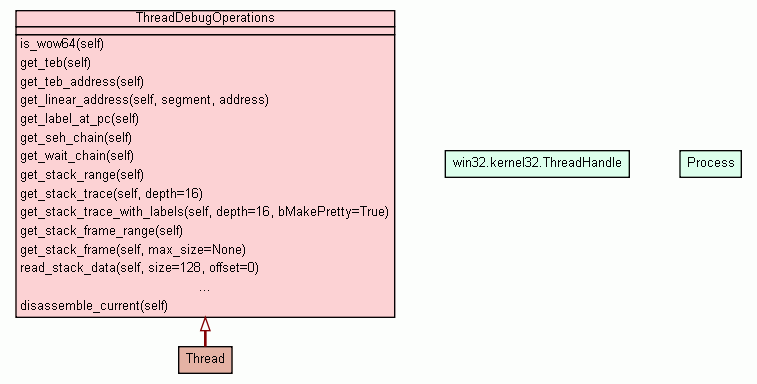
| Home | Trees | Indices | Help |
|
|---|
|
|

Encapsulates several useful debugging routines for threads.
|
|||
| tuple of tuple( int, int, str ) |
|
||
| tuple( int... ) |
|
||
| tuple( int... ) |
|
||
|
Inherited from |
|||
| Properties | |||
|---|---|---|---|
| bool |
|
||
| TEB |
|
||
| int |
|
||
| Disassembly | |||
| list of tuple( long, int, str, str ) |
|
||
| list of tuple( long, int, str, str ) |
|
||
| list of tuple( long, int, str, str ) |
|
||
| list of tuple( long, int, str, str ) |
|
||
| tuple( long, int, str, str ) |
|
||
| tuple( long, int, str, str ) |
|
||
| Stack | |||
| tuple( int, int ) |
|
||
| tuple of tuple( int, int, str ) |
|
||
| tuple of tuple( int, int, str ) |
|
||
| tuple( int, int ) |
|
||
| str |
|
||
| str |
|
||
| str |
|
||
| tuple( int... ) |
|
||
| tuple( int... ) |
|
||
| Miscellaneous | |||
| int |
|
||
| str |
|
||
| list of tuple( int, int ) |
|
||
| tuple of ( list of win32.WAITCHAIN_NODE_INFO structures, bool) |
|
||
| str |
|
||
| str |
|
||
| dict( str → str ) |
|
||
| dict( str → str ) |
|
||
|
|||
|
Inherited from |
|||
|
|||
Determines if the thread is running under WOW64.
|
Returns a copy of the TEB. To dereference pointers in it call Process.read_structure.
|
Returns a remote pointer to the TEB.
|
Translates segment-relative addresses to linear addresses. Linear addresses can be used to access a process memory, calling Process.read and Process.write.
|
|
|
|
|
Tries to get a stack trace for the current function. Only works for functions with standard prologue and epilogue.
|
Tries to get a stack trace for the current function. Only works for functions with standard prologue and epilogue.
|
Tries to get a stack trace for the current function. Only works for functions with standard prologue and epilogue.
|
Returns the starting and ending addresses of the stack frame. Only works for functions with standard prologue and epilogue.
|
Reads the contents of the current stack frame. Only works for functions with standard prologue and epilogue.
|
Reads the contents of the top of the stack.
|
Tries to read the contents of the top of the stack.
|
Reads DWORDs from the top of the stack.
|
Tries to read DWORDs from the top of the stack.
|
Reads QWORDs from the top of the stack.
|
Tries to read QWORDs from the top of the stack.
|
Tries to read some bytes of the code currently being executed.
|
Tries to read some bytes of the code currently being executed.
|
Tries to guess which values in the registers are valid pointers, and reads some data from them.
|
Tries to guess which values in the given data are valid pointers, and reads some data from them.
|
Disassemble instructions from a block of binary code.
|
Disassemble instructions from the address space of the process.
|
Disassemble around the given address.
|
Disassemble around the program counter of the given thread.
|
Disassemble the instruction at the given memory address.
|
Disassemble the instruction at the program counter of the given thread.
|
| Home | Trees | Indices | Help |
|
|---|
| Generated by Epydoc 3.0.1 on Fri Feb 12 19:46:26 2010 | http://epydoc.sourceforge.net |